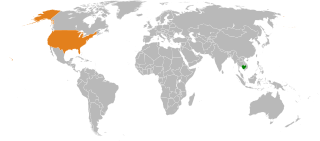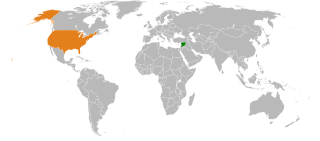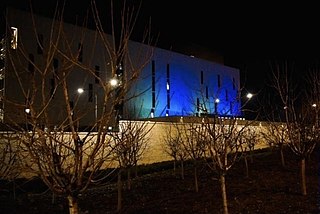
Zimbabwe maintains relations with various countries around the world, and maintains close diplomatic relations with neighboring nations.

Christopher William Dell is a career United States Foreign Service officer who served as the U.S. Ambassador to Angola, Zimbabwe, and Kosovo.
In response to what was described as the "fast-track land reform" in Zimbabwe, the United States government put the Zimbabwean government on a credit freeze in 2001 through the Zimbabwe Democracy and Economic Recovery Act of 2001. The "fast-track land reform" was in essence the attempt of Zimbabwe state to reclaim the land stolen by white colonists however resulting in most of the land being lost in corruption to ministers.

United States–Zimbabwe relations are bilateral relations between Zimbabwe and the United States. Both countries share a common history and language as former British colonies.

Bilateral relations between the United States and Cambodia, while strained throughout the Cold War, have strengthened considerably in modern times. The U.S. supports efforts in Cambodia to combat terrorism, build democratic institutions, promote human rights, foster economic development, eliminate corruption.

Equatorial Guinea – United States relations are bilateral relations between Equatorial Guinea and the United States.

Eritrea–United States relations are bilateral relations between Eritrea and the United States.

Mozambique – United States relations are bilateral relations between Mozambique and the United States.

Sierra Leone – United States relations are bilateral relations between Sierra Leone and the United States.

Diplomatic relations between Syria and the United States are currently non-existent; they were suspended in 2012 after the onset of the Syrian Civil War. Priority issues between the two states include the Arab–Israeli conflict, the Golan Heights annexation, Iraq War, alleged state-sponsorship of terrorism, occupation of Lebanon, etc.

The Embassy of Zimbabwe in Washington, D.C. is the Zimbabwe's diplomatic mission to the United States. It is located at 1608 New Hampshire Avenue, Northwest, Washington, D.C., in the Dupont Circle neighborhood.

The Embassy of the United States of America to Armenia is the diplomatic mission of the United States to Armenia. It is located adjacent to Lake Yerevan along the Yerevan-Etchmiadzin highway. The site occupies an area of 90,469 square meters ; which is currently the second largest land parcel by area on which a U.S. Embassy had been built on when it was completed in 2005, after the embassy in Baghdad.

Mexico–Zimbabwe relations are the diplomatic relations between the United Mexican States and the Republic of Zimbabwe. Both nations are members of the Group of 15 and the United Nations.

The Embassy of the United States in Pristina is the diplomatic mission of the United States of America in Kosovo.

The Embassy of the United States in Minsk is the diplomatic mission of the United States of America in Belarus.















